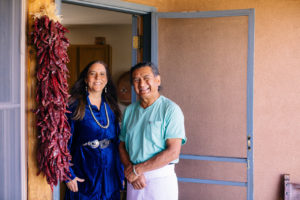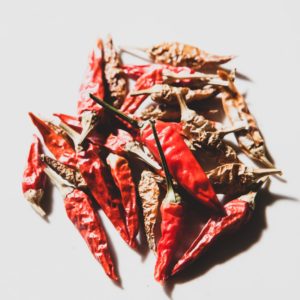By Isabel Yoder, Food Policy and Sustainability Leadership Certificate student
This blog is part of a series from the December Arizona Immersive program of the Food Policy and Sustainability Leadership Graduate Certificate Program. Students virtually toured the state, meeting with farmers, ranchers, entrepreneurs, government staff and non-profit leaders.
Whisking us through a lively cooking demonstration that we could almost smell and taste through our Zoom screens, Chef Dr. Lois Ellen Frank and her partner Walter Whitewater provided a vibrant history of Native American foodways. Through this cooking demonstration, the Chefs displayed and spoke of all of the elements that make up community foodways: the growing and production of agricultural products, their harvesting and cooking techniques, and how food is presented and consumed— and thus affects the health and wellness of Native communities. Healthy land and agricultural practices promote healthy communities, and healthy souls. Food is not just something that keeps individuals alive: reclaiming traditional foodways is medicine, a sovereign right, and the key to long-term health and flourishing of Native communities.
Weaving together sustainable agricultural practices with exciting and inspiring cuisine, Frank and Whitewater are inspiring educators and leaders in the Native American movement to reclaim traditional foodways and encourage food sovereignty. Chef Frank explained the necessity of producing, growing, and harvesting native varieties of food for the growth of the food sovereignty movement. Our hosts conducted their cooking demonstration, making homemade tortillas from scratch— combining masa flour (made from locally-grown, native corn) and water, then pressing the tortillas with a traditional tortilla press, and cooking them on the stove. Meanwhile, Chef Frank used various native chilies and other ingredients to make a vibrant roasted chili salsa. This alone catches a consumer’s attention: fresh foods made with exciting ingredients and techniques. This delicious recipe set the backdrop for Chef Frank and Whitewater’s insight into the evolution of native cuisine and the connections between food, traditional culture, and community wellness. The passion and effortlessly complex techniques that Chef Frank employed during the cooking demonstrated her commitment to native foodways. The demonstration concluded with drumming, highlighting the importance of food and cooking as a cultural experience meant to be enjoyed as a community.

Chef Frank and Mr. Whitewater emanated respect for indigenous foodways by using ancestral techniques and ingredients to cook their contemporary and exciting meal. This reflects how Indigenous food systems have evolved from the precolonial period to today. Chef Lois spoke to us about the three sisters of traditional Native food production: corn, squash, and beans. Chiles, tomatoes, potatoes, tomatoes, vanilla, and cacao are other foods linked with Native communities. These fundamental ingredients stemming from original Native food production reminds us how much of a role Native peoples have played in so many fundamental ingredients and dishes we consume today. Native foodways have been disrupted throughout history through colonization and then through the forced relocation of Native communities onto reservations. Through these processes, their locally-grown and healthy diets were replaced by commodities distributed by the government: flour, lard, sugar, and canned foods. These historical occurrences continue to influence food consumption in Native communities even as they reclaim traditional techniques. By supporting the use of local, sustainable foods, consumers support food sovereignty, especially for Native communities that are claiming more ownership over their food production and consumption.
The work of Chef Lois Ellen Frank and Walter Whitewater will continue to sustain and revive traditional Native foods, agricultural practices, and food production techniques. By focusing on community agricultural practices and purchasing traditional foods to help invigorate native food and agricultural practices, they are encouraging the continued future of Native foods and traditions. All along the supply chain, Native communities benefit from a movement towards food sovereignty. Our hosts represent the hope for powerful leadership promoting new initiatives and new futures for Native food production and consumption, as Native communities define what foods are important to their community, reaching back to their traditional roots of production and food techniques. As they discussed, just one generation could lose traditional knowledge around Native foodways. Their work along with the work of Native leaders and communities will ensure this valuable insight is never lost.
And of course, never forget that eating spicy chilies releases endorphins!
